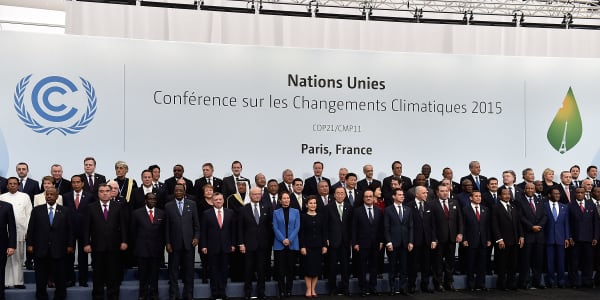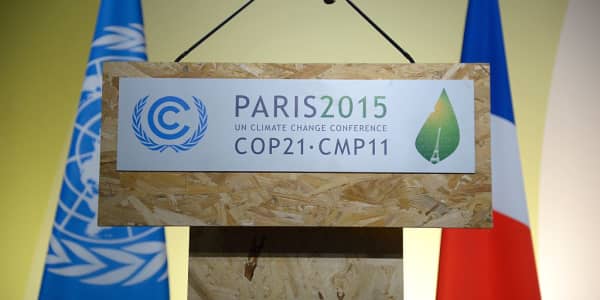Crucial climate talks kicked off in Paris this week, with heads of state and negotiators from 195 countries arriving in France with the stated aim of striking a deal on cutting global carbon emissions and limiting global warming.
Talks at the 21st Conference of Parties summit or "COP21" will focus on an agreement that could limit global warming to 2 degrees Celsius or lower, with current international policies viewed as insufficient to do so.
Coal: Fossil fuels' worst offender?
Fossil fuels – those that derive from the fossils of once-living organisms, including coal, oil and natural gas – produce high percentages of carbon, contributing to carbon dioxide (CO2) emissions, which are viewed as a large factor behind climate change.
The United Nations-backed Intergovernmental Panel and Climate Change has called for the unrestricted use of fossil fuels to be ended by 2100.
Of the fossil fuels, coal is by far the biggest culprit – the burning of coal contributes to a staggering 90 percent of all emissions from fuel combustion in China, the U.S., the European Union and India, according to data from investment firm Bernstein.
China and the U.S. are the world's two biggest users of coal and together account for almost half of all the world's CO2 emissions.
Analysts argue that the global coal industry is "already on its knees," under pressure from the other energy sources like cheap gas. However, large industrialized developing nations like India and China still have a long way to go before the phasing it out can become a reality or even a long-term project.
"For most of the developing countries it is about getting money to do things slightly more sustainable. So it is hard to see the big emitters coming to it with anything they can offer that hasn't already been pledged. It doesn't feel like there is a lot of wiggle room," said head of natural gas, coal and carbon at Energy Aspects, Trevor Sikorski.
'Dirty fuels' subsidized
Ahead of the Paris talks, the Organization for Economic Co-operation and Development (OECD) said that the world should spend much less on supporting "dirty fuels" such as coal and oil and focus on renewable energy sources such as solar and wind power.
Governments worldwide spend $600 billion a year subsidizing fossil fuels – some $200 billion of that in developed and emerging economies, the OECD said. The $600 billion figure is five times the amount spent supporting clean energy ($112 billion) and more than five times the amount rich nations have promised to poorer countries to help tackle climate change ($100 billion), the organization said.
Tax policies are also failing to sufficiently incentivize curbing carbon emissions, according to the OECD. Coal is the most polluting fuel, but still thought to be the least taxed of any energy sources.
Some 85 percent of coal used for heating and industrial processes in OECD and emerging countries is untaxed and the average tax rate on coal is below 2 euros per ton of CO2.
US coal on the way out?
Plans to cut back on coal are unlikely to be ratcheted up just because of COP21, Sikorski said, but nonetheless, coal has been steadily losing its share of international energy provision.
While it still accounts for 35 percent of energy generation globally, it has lost 9 percentage points of market share since 2009, according to Goldman Sachs. Further declines, to around 33 percent of market share, are expected by the end of 2018, analysts at the bank predict.
That is because many aging coal-fired power plants face accelerated retirement due to tightening emission regulations and growing competitive pressures from cheap gas and rapidly growing renewable sources.
No country has felt this more keenly than the U.S., where a combination of low world market prices and weak export demand has had significant adverse consequences for the coal industry. The U.S. largest four coal companies lost over 90 percent of their market capitalization in 2015, Goldman Sachs said on Monday.
Meanwhile, the U.K. government has announced that coal-fired power generation will cease altogether by 2025.
"You have already got the U.S. moving away from coal, just because gas has been so cheap. The coal industry is kind of on its knees at the moment," Sikorski said.
"They pushed through on the Environmental Protection Agency (EPA) regulations, they just closed down around 15 gigawatt (GW) of coal fired power stations, and they have got the new CO2 rule as well which says you cannot build a new coal-fired power station."
China and India take it slow
China, which is responsible for about half of global coal demand, is poised for its biggest decline in consumption of the fuel in history, according to a report published by Greenpeace last month. This comes as the world's second largest economy attempts to move to cleaner forms of renewable energy.
"The encouraging stance of China ahead of a major international climate change summit is unprecedented, given the success of its renewable energy investments ($80 billion in new renewables spent in 2014) and new policies and regulations to upgrade the nation's coal-fired power generation fleet," senior analyst at Bernstein, Cosma Panzacchi, said.
But this does not mean that the country can shift away from its reliance on coal any time soon.
"China is still going to rely on coal. They are doing stuff to minimise coal, but that is a long way away I think from saying 'We are going to fundamentally reorganise our whole energy policy away from coal,'" Sikorski said.
In India, around 70 percent of power production comes from coal. The country has made it clear that it does not intend to agree to phase out fossil fuels by 2100 and that it will "not be bullied into accepting the position of developed countries" Panzacchi said.
Sikorski added: "It is very difficult to see any of these big emitters saying they will fundamentally re-orientate themselves away from coal. Maybe Australia you could see, but it is a big part of their exports, so I am not really sure."









